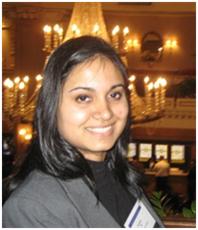 | Farzana Z. Ali, MPH, CPH Class of 2009 Health Analytics concentration |
Please tell us about some of your activities since your graduation from the MPH program?
After my MPH graduation, I presented a poster on my master’s project at the American Public Health Association Annual Meeting in Washington, DC. This presentation has led to an invitation for manuscript submission in a peer-reviewed academic journal. My background in evaluative sciences has significantly enhanced my research skills, and allowed me to be a part of research teams in the Department of Physiology and Biophysics as well as the Department of Radiology at the Stony Brook University Medical Center. During my last semester in the program, one of my professors kindly referred me to the World Bank group in Washington DC to work as a consultant. I am very happy to continue working with this great organization.
How has your MPH degree influenced your career?
The analytical skills I have acquired during my MPH have been the cornerstone of my research career. My degree in evaluative sciences required me to design my own project and write programs for data analysis. I have acquired the skills needed to perform independent research, a quality that has played a vital role in my research pursuits in the biomedical field. Other than quantitative analysis, my course work included classes that were primarily discussion-based, and had increased my awareness of contemporary issues, and helped me understand the relevance of my endeavors in public health and biomedical sciences. I entered this program as an ordinary student seeking further education in a health care field, and came out as an independent researcher and public health professional with the skills necessary to contribute to the health care community in a meaningful way.
What advice would you give a new student just starting the program?
I would encourage a new student to make time to connect with his/her peers, and discuss academic plans as it will be valuable during their journey in the Master’s program. The level of difficulty in the graduate classes is obviously different from what we have experienced in our undergraduate career. The support from your classmates will help you keep up with your course work. Moreover, I would highly encourage the students to take advantage of the office hours of their professors, and to communicate with the faculty members in the department. You don't always have to have questions about your class material to see your professor, feel free to share your project ideas outside of class, or just stop by to greet them. These connections you make during your graduate career will be very helpful when you transition from the role of a student to a professional.
Posted Spring 2012
